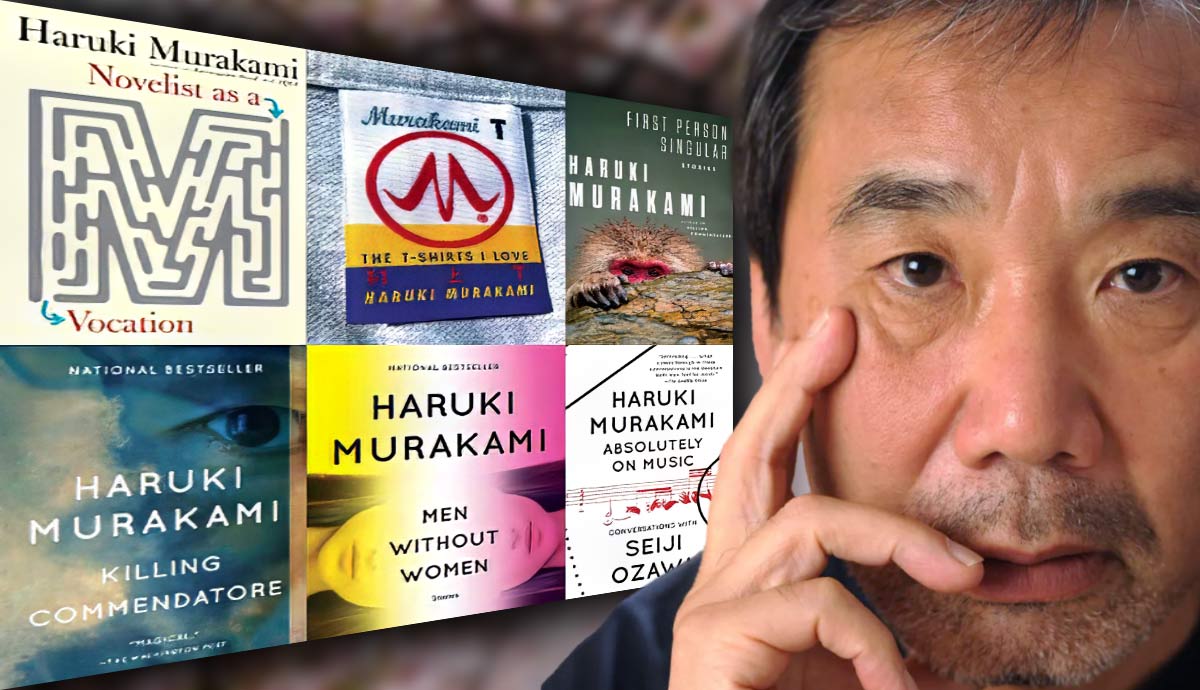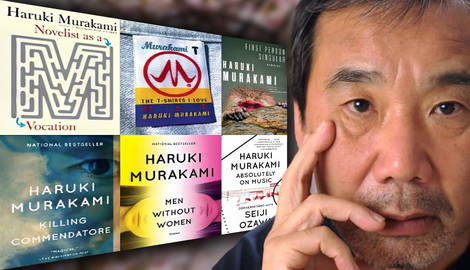
Over the past few decades, writer Haruki Murakami has created a magical realist body of work that weaves together the ordinary and the mysterious. One may call his writing style magical realism, but what makes the literary output of Murakami so unique is the lingering sense of longing and mystery underpinning each story. His books are usually centered on a solitary and emotionally repressed male character whose reality gets infiltrated by occurrences in a dreamlike parallel world. Read on to find out more about this extraordinary writer…
Haruki Murakami´s Unique imprint on the World of Literature

Using nothing but the power of imagination (and his pen), Haruki Murakami has succeeded in creating a world where dreams and reality meet. But while the Japanese writer has been criticised for the lack of clear resolutions in his stories and novels, it is this very intangibility that keeps his worldwide readership wanting more.
Murakami´s prose is straightforward and simple, while his characters are almost painstakingly ordinary. And yet, his stories point towards a realm that is beyond the clearly definable and resolvable—a world beyond the conscious, logical mind. In this article, we will lead you through the life and work of Haruki Murakami by revealing ten facts about the likely future recipient of the Nobel Prize…
1. Haruki Murakami Got Married Very Young

Haruki Murakami was born in 1949, during a time when Japan was still under US occupation. At the time of his birth, Japan was still recovering from the nuclear strikes in Hiroshima and Nagasaki. Having just come out of the trauma of the war, Japanese society started rebuilding itself on a set of traditional values influenced by the American way of life. The formula was simple: get a degree, get a job, get married. But Haruki Murakami did not want to resign himself to the life of climbing the corporate ladder. So, he decided to do things the other way around. He started by getting married first, getting a job, and then completing his degree in Theatre and Film. His choice was seen as incredibly irresponsible in the eyes of Japanese society at the time.
Up to this day, his wife Yoko Murakami continues to be his first reader and harshest critic. According to him, she is also the only one who pulls him out of the endless re-editing of his most recent work. My wife knows when a book is ready for publication, the writer revealed in an interview.
2. Murakami Used to Own a Jazz Bar

But marriage wasn’t the only area of life where Haruki Murakami decided to go against the grain. He also opted against the secure path of taking a corporate job. Instead, his wife and he opened a jazz bar in Kokubunji, a city located on the outskirts of Tokyo. While this allowed him to indulge in his love of music, the early years were tough. The couple had to work several jobs and borrow money to start their venture. Once they opened the bar, paying off their debts remained a struggle. Luckily, all this turned around when Murakami started writing: Today, Haruki Murakami has sold millions of books world-wide and his net worth is estimated to be close to 100 million dollars.
3. He Had an Epiphany While Watching a Baseball Game

Although Haruki Murakami had been an avid reader since childhood, it never occurred to him that he too could become a writer. According to his own account, all this changed while he was watching a baseball game one day. In 1978 the writer found himself stretched out on the grass with a beer in his hand, watching the season-opening game between the Yakult Swallows and Hiroshima Carp. At the exact moment when Swallow’s first batter hit the ball of the opposing team into left field, Murakami got struck by an epiphany. He thought that he could write a novel. This did not mean that writing books came easily to him, however…
4. He Wrote His First Book in English

Upon leaving the baseball stadium, Haruki Murakami immediately went to a store to buy a pen and paper and then he started writing. Despite working long hours at his Jazz bar, he managed to finish his first novel Hear the Wind Sing within the timespan of six months. However, he was incredibly unhappy with his first draft. In order to fix this, he decided to try a different strategy. Instead of writing in Japanese, he decided to write his first book in English.
Writing in a foreign language and with a limited vocabulary forced him to use simple sentences and a direct writing style. Once the English version of the book was finished, he used the English text as a basis for writing the final version in Japanese. It seems that the experiment worked—Hear the Wind Sing ended up winning the New Writers Prize of the literary magazine Gunzo. Following the publication of Hear the Wind Sing, Haruki Murakami went on to write his second book Pinball, 1973. Shortly after, he decided to sell his jazz bar and devote the rest of his life to writing.
5. Norwegian Wood Is His Only Realist Novel

Over the decades that followed, Haruki Murakami created his very own version of magical realism which he is internationally famous for. But his love for the surreal doesn’t mean that Murakami never tried his hand at realism. In fact, his book Norwegian Wood, which he published in 1987, represented his first (and only) attempt of writing a realist novel. Norwegian Wood ended up being a major success and catapulted his name into the cultural mainstream of Japan. Murakami did not let the success of his realist work derail him from his path, however: Following the success of Norwegian Wood, he went back to writing novels that blurred the lines between the real and the surreal.
6. He Is Incredibly Disciplined

When thinking of artists and writers, one often imagines them leading a lifestyle full of late nights, chaotic emotions, and sudden bursts of inspiration. The example of Haruki Murakami shows that this is not always the case. The writer is famous for following a strict routine. He gets up at 4 in the morning, writes until noon, and then spends the afternoon training for his next marathon, taking care of chores, and listening to music. He usually goes to bed no later than 9 p.m.
7. He Calls His Subconscious Mind The Other Room

When asked about his creative process, the author usually responds in a very practical, down-to-earth way: Every day I go to my study and sit at my desk and put the computer on. At that moment, I have to open a door. The writer likes to call the place behind this door The Other Room. It’s the place of his subconscious. Opening and closing that door is an act that takes a lot of strength. Having a strict routine helps Murakami make sure he opens and closes that door every single day.
It is how he managed to write books like IQ84, a novel spanning over 1000 pages.
8. He Is an Avid Runner

But Haruki Murakami isn’t just disciplined when it comes to his writing. He is also an incredibly disciplined runner. Over the course of his life, he has run over 23 marathons, an ultramarathon, and several triathlons. Murakami´s love of running has even inspired him to write an entire book about it. In 2007, he published What I Talk About When I Talk About Running, a memoir in which he philosophizes about running and draws many parallels between running and writing. In his view, both running and writing are endurance sports. If you want to make progress, you need to show up and do the work every single day.
9. He Also Works as a Translator

Haruki Murakami has written over 16 novels and many short stories and essays, but he is also active as a translator. He even translated texts by authors like Raymond Carver, John Irving, and J.D. Salinger from English into Japanese. However, the writer refuses to translate his own books into the English language. And while he does proofread the English version of his novels, he claims to do nothing more than dispute a few words here and there.
10. The Great Gatsby is His Favorite Book

The writer’s three favorite books include Dostoyevsky´s The Brothers Karamazov, Chandler´s The Long Goodbye, and Fitzgerald´s The Great Gatsby. He didn’t find any of the existing translations of the famous Jazz Age novel satisfying, so Murakami decided to create his own translation of F. Scott Fitzgerald’s classic by the age of 60. He achieved this goal a few years earlier than expected.

If you would like to dive deeper into Haruki Murakami´s universe of lonely men, mysterious women, and alternate realities, there is no better way than reading his large collection of books and short stories. Or you might run into him while participating in your next marathon.










